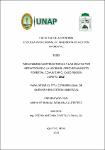| dc.contributor.advisor | Gratelly Silva, Pedro Antonio | |
| dc.contributor.author | Babilonia Gutierrez, Maria Fernanda | |
| dc.date.accessioned | 2024-01-05T18:37:58Z | |
| dc.date.available | 2024-01-05T18:37:58Z | |
| dc.date.issued | 2023 | |
| dc.identifier.other | 634.98 B11 2023 | |
| dc.identifier.uri | https://hdl.handle.net/20.500.12737/9669 | |
| dc.description.abstract | The present investigation evaluates the compensatory mechanisms for fines of rural communities for the poor use of forest resources in the Loreto Region. It is a non-experimental, observational, descriptive, analytical, retrospective and longitudinal quantitative research. Secondary information was obtained from the records of the Community Forest Management Unit of the National Forestry and Wildlife Management. The data were processed in Excel Software and the hypothesis contrast was carried out with SPSS 27 software. It is determined that the number of communities with fines that benefit from this fine compensation mechanism is 63 throughout the Loreto region. The level of non-compliance with the Forestry Law, of the 310 peasant or native communities with a qualifying title, all have incurred infractions, and only 18% of the 310 communities have complied with the payment of their fines. The volumes of illegally extracted wood tend to vary and it is indifferent whether these communities are native or peasant communities, as well as the extensions of the authorized areas. It is evident that the communities that have the highest volumes of illegal wood extraction are those that have better conserved forests and are richer in forest species and secondly, they are communities that are very remote and difficult to access, which encourages the wood extractor to commit this type. of violations of the Forestry Law, protected by impunity due to the lack of control and in situ presence of the State. Of the peasant or native communities that benefit from the fine compensation mechanism, 100 percent benefit from the compensation mechanism through the Conservation of the affected areas and none benefit from the reforestation mechanism. From the "r" Sperman statistic, it is concluded that the null hypothesis is rejected and the alternative hypothesis is accepted, which mentions that the Fine Compensation Mechanisms in the communities guarantee a low and medium level of significance of Community Forestry Use in the Loreto region. | en_US |
| dc.description.abstract | La presente investigación evalúa los mecanismos compensatorios a multas de las comunidades rurales por el mal aprovechamiento de los recursos forestales en la Región Loreto. Es una investigación cuantitativa de tipo no experimental, observacional descriptivo, analítico, retrospectivo y longitudinal. La información secundaria fue obtenida de los registros de la Unidad de Manejo Forestal Comunitario de la Gerencia Nacional Forestal y de Fauna Silvestre. Los datos se procesaron en Software Excel y el contraste de la hipótesis se realizó con el software SPSS 27. Se determina que el número de comunidades con multas que se acogen a este mecanismo de compensación a multas son 63 en toda la región Loreto. El nivel de incumplimiento de la Ley forestal, de las 310 comunidades campesinas o nativas con título habilitante, todas han incurrido en infracciones, y tan sólo el solo 18% de las 310 comunidades han cumplido con el pago de sus multas. Los volúmenes de madera extraídas ilegalmente tienden a variar y es indistintamente indiferente sean estas comunidades nativas o campesinas, así como las extensiones de las áreas habilitadas. Se evidencia que las comunidades que tienen mayores volúmenes de extracción ilegal de madera son las que poseen bosques mejor conservados y más ricos en especies forestales y en segundo lugar son comunidades muy alejadas y de difícil acceso, lo cual incentiva al extractor maderero a cometer este tipo de infracciones a la Ley Forestal, amparados en la impunidad debido a la falta de control y presencia In situ del Estado. Las comunidades campesinas o nativas que se acogen al mecanismo de compensación a las multas, el 100 por ciento se acogen el mecanismo de compensación a través de la Conservación de las áreas afectadas y ninguna se acoge al mecanismo de reforestación. Del estadístico “r” Sperman se concluye que se rechaza la hipótesis nula y se acepta la hipótesis alterna que menciona que los Mecanismos de compensación a multas en las comunidades garantizan un nivel bajo y medio de significancia en el Aprovechamiento Forestal Comunitario en la región Loreto. | es_PE |
| dc.format | application/pdf | es_PE |
| dc.language.iso | spa | es_PE |
| dc.publisher | Universidad Nacional de la Amazonía Peruana | es_PE |
| dc.rights | info:eu-repo/semantics/openAccess | * |
| dc.rights.uri | https://creativecommons.org/licenses/by/4.0/ | * |
| dc.subject | Aprovechamiento de la madera | es_PE |
| dc.subject | Infracciones | es_PE |
| dc.subject | Gestión ambiental | es_PE |
| dc.subject | Comunidades rurales | es_PE |
| dc.title | Mecanismos compensatorios a las multas por infracciones a la ley en el aprovechamiento forestal comunitario: caso región Loreto. 2022 | es_PE |
| dc.type | info:eu-repo/semantics/bachelorThesis | es_PE |
| thesis.degree.discipline | Ingeniería en Gestión Ambiental | es_PE |
| thesis.degree.grantor | Universidad Nacional de la Amazonía Peruana. Facultad de Agronomía | es_PE |
| thesis.degree.name | Ingeniero(a) en Gestión Ambiental | es_PE |
| dc.subject.ocde | https://purl.org/pe-repo/ocde/ford#4.01.02 | es_PE |
| renati.author.dni | 76181020 | |
| renati.advisor.orcid | https://orcid.org/0000-0002-1708-7101 | |
| renati.advisor.dni | 05220057 | |
| renati.type | https://purl.org/pe-repo/renati/type#tesis | es_PE |
| renati.discipline | 521236 | es_PE |
| renati.level | https://purl.org/pe-repo/renati/level#tituloProfesional | es_PE |
| renati.juror | Manrique del Aguila, Julio Abel | |
| renati.juror | Yalta Vega, Ronald | |
| renati.juror | Avila Fucos, Manuel Calixto | |
| dc.publisher.country | PE | es_PE |





